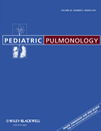Cardiorespiratory measurements during field tests in CF: Use of an ambulatory monitoring system
Abstract
Respiratory inductive plethysmography (e.g., LifeShirt) may offer in-depth study of the cardiorespiratory responses during field exercise tests. The aims of this study were to assess the reliability, discriminate validity, and responsiveness of cardiorespiratory measurements recorded by the LifeShirt during field exercise tests in adults with CF. To assess reliability and discriminate validity, participants with CF and stable lung disease and healthy participants performed the 6-Minute Walk Test (6MWT) and Modified Shuttle Test (MST) on two occasions. To assess responsiveness, participants with CF experiencing an exacerbation performed the 6MWT at the start and end of an admission for intravenous antibiotics. The LifeShirt was worn during all exercise tests. Reliability and discriminate validity were assessed in 18 participants with CF (mean (SD) age: 26 (10) years; FEV1 %predicted: 69.2 (23)%) and 18 healthy participants (age: 24 (5) years, FEV1 %predicted: 92 (8)%). There was no difference in 6MWT and MST performance between days and reliability of cardiorespiratory measures was acceptable (bias: P > 0.05; CV < 10%). Participants with CF demonstrated a significantly greater response to exercise (e.g., ventilation, respiratory rate) compared to healthy participants indicating discriminate validity. Responsiveness was assessed in 12 participants with CF: clinical measurements and 6MWT performance improved (61 (81) min; P < 0.05) however, cardiorespiratory measurements recorded by the LifeShirt remained the same (bias: P > 0.05; CV < 10%). This study provides evidence that cardiorespiratory responses can be measured non-invasively during field exercise tests in adults with CF. Reliability and discriminate validity of key cardiorespiratory measurements recorded by the LifeShirt were demonstrated. Some information on responsiveness is reported. Pediatr Pulmonol. 2011; 46:253–260. © 2011 Wiley-Liss, Inc.




